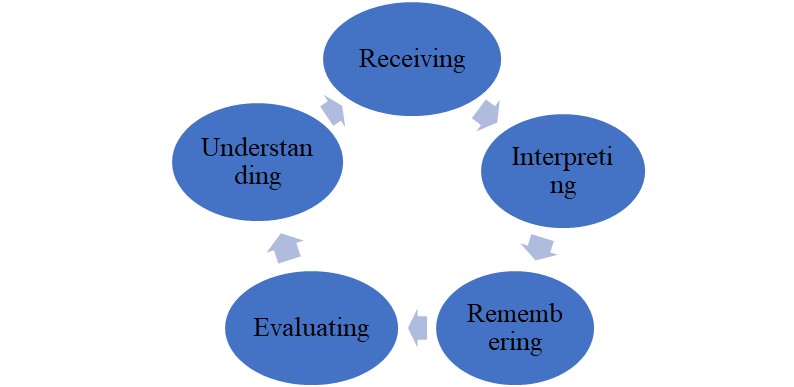What is Listening skill?
Listening is receiving sounds through ears and identifying the speech sounds. Listening is the ability to pay attention and understand the communicated information and providing appropriate feedback. Listening is the key to effective communication, without which messages can be misunderstood. It seems to be a natural activity but an essential skill that has to be mastered. Listening is a receptive process which demands a lot of attentiveness.
Listening Process-
Process means a series of actions involved to complete a task successfully. Listening is a process which involves receiving sounds and interpreting them into meaningful words. This involves five stages in order to understand and retain what we hear fully.
• Receiving – This is an intentional focus on the sounds produced by a speaker. Here the listener receives or hears the sounds through his ears. This is the response caused by the sound waves which stimulates the sensory receptors of the ear.
• Understanding/Interpreting - This is the stage where we attempt to attach meaning to the words received. Here the sound received by the ear reaches the brain, and the sounds are deciphered into meaningful words of a language. Understanding the words depends on the background, experience and accent of the speaker. This also depends on our perceptions and prior experience with the concerned speaker. For example, advice given by a person can be taken in the right sense by his close friend, but an acquaintance or a colleague may not necessarily take it positively. Instead, he could be annoyed and take it to be sarcastic. For better interpersonal relationship, a listener must understand the intended meaning of the speaker along with the context.

• Remembering – Remembering is an important stage of the listening process, which shows the listener has not only heard the sounds but also has interpreted the sounds and stored it like words in the brain. Day-to-day messages or communication is easy to understand while a highly complex message or a new concept demands greater listening skill. Here, the comprehended message is absorbed and stored to facilitate future recall.
• Evaluating – The fourth stage of the listening process is evaluating or analyzing the received message. This evaluation again can vary from one person to the other. Messages are positively evaluated if the speaker speaks clearly in a convincing way with valid data and a positive body language rather than being rude and authoritative. Personal opinions or prejudices also have a role in evaluating one’s message. It is always better to refrain from making judgments and to focus on the message of the speaker.
• Responding – Responding also referred to as the feedback is the final stage of the communication process. This is where the listener shows his involvement or participation in the communication process. Any signal given verbally or non-verbally is considered to be feedback from the listener. For example, after a lecture in a classroom, if the students come up with some doubts or questions for clarification, it is a positive response. While the same students trying to leave the lecture room immediately is considered to be a negative sign.